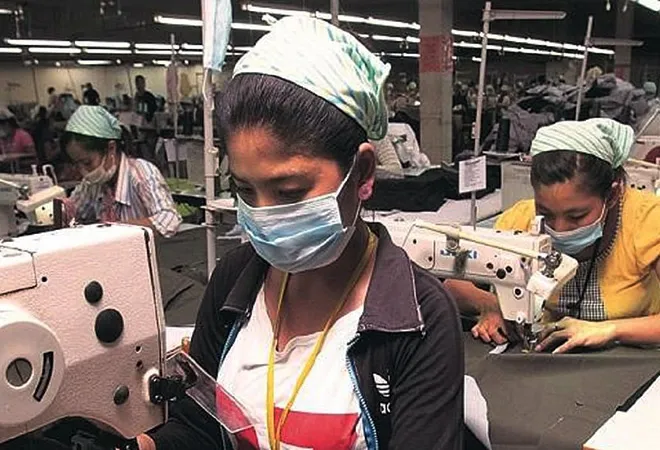
India is in Unlock Phase II from 1 July. However, the process is yet to infuse the desired degree of dynamism. With economic activity yet to take-off in any meaningful manner, the common perception is still of stagnation.
According to a CRISIL study on the effect of the pandemic the Indian economy is likely to shrink by 5 percent in Fiscal 2021 and India will register a loss of about 10 percent of GDP in real terms. The study blames continuing lockdown over a prolonged period as the sole reason for the dismal economic performance. The practice of restrictive opening up, followed as an interim measure during lockdown did not help matters as many of the places permitted for commencement were low activity centres, which could not meaningfully contribute to the ‘restart’.
CRISIL further said India Inc is headed towards a 15 percent decline in revenue and 25 percent fall in EBIDTA. However, for small businesses, the fall in revenue would be 17 to 21 percent, while EBIDTA margin would shrink by 200 to 300 bps to 4-5 percent. The report also observed that the sharp decline at the operating level will also “impact creditworthiness, aggravating the liquidity stretch these units have been grappling with”. As a result, average interest service coverage ratio could slide to 1-1.5 times from 2.4 times seen between fiscals 2017 and 2020.
MSMEs are vital to the economy. The sector is a crucial part of the supply chain. Survival of the sector is absolutely necessary for the economy to revive and grow. As highlighted by CRISIL, the prognosis regarding the sector appears dim in this pandemic stricken time. To ensure survival of the sector, it is necessary to have an “out of the box” solution. Traditional solution of providing large and easy credit may not be the panacea for a sector which has been out of business for long. The government of India has initiated the Atmanirbhar Bharat campaign for economic revival. The programme, inter alia, provides for infusion of fresh equity, and a time bound proposal for clearance of receivables for the MSME sector. It is of crucial importance that the twin proposals are implemented early, as revival of MSMEs would crucially depend on availability of zero/low cost funds for restart and initial operations, after reopening.
Origin of the crisis
Lockdown was imposed by an administrative order, which closed down production, supply, distribution, procurement and physical movements of goods and services. It paralysed manufacturing and also the supply chain. What started as a supply side problem, soon created problems of shrinking cash flow, non-payment of wages, salary, retrenchment, loss of jobs, and consequent decline in overall demand. The impeded cash flow has spawned potentially large NPAs, which have not yet surfaced, in view of the moratorium extended by the RBI. The original supply side problem might have now become a twin problem characterised by constraints on both supply and aggregate demand. The crisis has further aggravated by other important factors like shortage of labour pursuant to the sordid saga of the migrants, and lack of confidence amidst business uncertainty. Both factors affect revival adversely. The first reduces supply of experienced manpower, the second prods one to “stay liquid” even by postponing investment.
A successful rollback requires correction of supply and demand constraints as also rebuilding confidence. Historically, deep-rooted economic crisis has been tackled by monetary policy measures and/or direct intervention through investments. “New Deal” and Keynesian economic thought, are outstanding examples of direct intervention. Monetary policy measures, in crisis times, are usually aimed at easing liquidity through provision of additional credit and suitable restructuring of liabilities.
India has not yet adopted any major capital expenditure programme to counter the crisis. Though important reform measures are proposed under Atmanirbhar Bharat, these are likely to have an impact only over the long term. In the near term, the policymakers appear to be relying more on market forces, including credit off-take and increase in discretionary spending to overcome the crisis. Considering the scale of uncertainty, job losses and not too optimistic forecast, discretionary spending is unlikely to increase in the immediate term. The well-known difficulties of our banks would perhaps not enable extension of any major restructuring/relief programme. The proposed CGTMSE (Credit Guarantee Fund Trust for Micro and Small Enterprises) guarantee cover to banks for incremental lending to MSMEs could be helpful, but is limited in its scope, relative to the intensity of the crisis. Business units would, therefore, have to largely depend on market forces to overcome the crisis.
Need for equity/quasi equity support
Companies across scale, especially MSMEs, are facing extreme liquidity constraint, and face an existential challenge. Survival would depend on their ability to access liquidity by drawing down on reserves and sourcing exogenous funds. Such units also need deferment of their liabilities, through suitable restructuring as an immediate supporting relief measure. The one-time restructuring measure reportedly being considered by the RBI could be useful, if extended to MSMEs also and on customised terms. However, restructuring alone would not suffice for restarting such units, which would also need availability of adequate additional funds. Ideally, this additional fund should be provided by way of equity/quasi equity, as these MSMEs at present are unlikely to be in a position to bear the burden of additional loan and the accompanying servicing obligation even if such assistance is provided at attractive rates. Atmanirbhar Bharat has proposed subordinated debt for stressed MSMEs, wherein credit is to be extended to respective promoters for onward infusion as equity; and setting up a Fund of Funds for providing equity support to MSME units. These schemes could prove to be the most effective, in the situation of restart. As details of these schemes are awaited, possibility of suitably designing these schemes as a Restart Fund to extend equity support to affected MSMEs may be explored.
The government actively supports and encourages “Start Up” funds. In the present context, it is desirable to explore the possibility of formulating guidelines for setting up of “Restart Funds”, for extending equity support to such units. These funds can be in addition to the aforesaid equity funds proposed. The Restart Funds may be opened for participation by all classes of financial investors, including overseas VCs and PEs, and may be widely promoted. As many of these units prior to the disruption, had an established business model including in-house facilities, skills and technology, marketing relationships and other business enablers, many of them are likely to attract “Restart” capital.
Settlement of Receivable
As widely reported, such units are disadvantaged by delay/default in receipt of payment against supplies. Outstanding payment against supply by such units to government departments is estimated at around INR 5 lakh crores. Receivables from non-government buyers are also reportedly large. Quick release of such outstanding receivables, could make a significant difference on liquidity. In the absence of an active domestic factoring market, it would be of immense benefit to such units, if banks step in to liquidate the outstandings by discounting the underlying bills “without recourse” to the MSME units. The suggested facility may be initially extended for outstanding government and PSU bills. The discounted amount may be treated as ad-hoc credit to the respective government departments/buyers.
Considering the urgent need to strengthen the “weak link” and thereby reactivate the now moribund supply chain, it is desirable to initiate action for early liquidation of the outstanding receivables of the MSMEs from the private sector (non-government/non-PSU) buyers also. Banks have sanctioned additional credit facilities to companies to meet their business/liquidity needs, post COVID. In the interest of restarting the MSMEs, it may be desirable to earmark this enhanced credit facility with a priority for settlement of outstanding bills of MSME units. The enhanced facility sanctioned may be considered for release/disbursement only after deduction of the outstanding bills of MSMEs.
Conclusion
MSMEs have a crucial role to play in restarting the economy on a sustainable basis. Finance cost for the units have traditionally been high, primarily because of reliance on borrowed capital from informal sources. Facilitating access to equity and timely clearance of payment may not only help restart the supply chain, but also set the stage for creating a vibrant and sustainable MSME sector.
The views expressed above belong to the author(s). ORF research and analyses now available on Telegram! Click here to access our curated content — blogs, longforms and interviews.




 PREV
PREV


